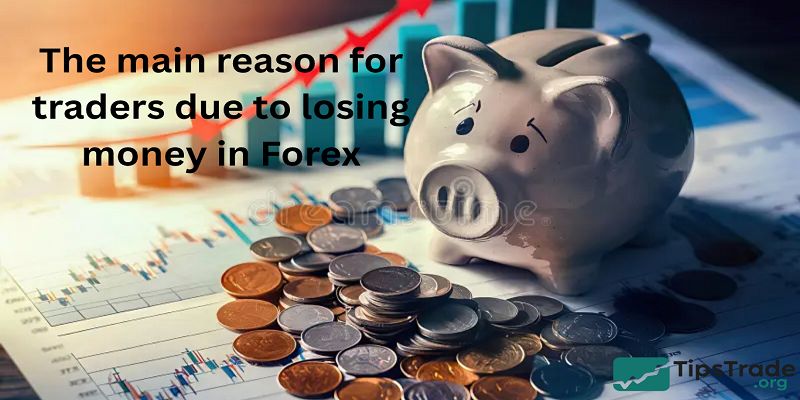Reasons for losing money in forex are more common than most beginners realize, with studies showing that over 70% of retail traders end up in the red. Many people enter the market with hopes of fast profits but overlook the real challenges of trading, such as poor risk management, overleveraging, and emotional decision-making. Understanding these mistakes is essential if you want to protect your capital and improve your performance. In this guide, we will break down the most frequent causes of trading losses and provide practical tips to help you avoid them.
Why Many Traders Fail

The 70–80% Statistic and What It Implies
- The most quoted statistic in forex is that roughly 70–80% of traders lose money. This number is not a scare tactic; it comes from regulated brokers in Europe who are legally required to disclose the percentage of losing accounts on their websites.
- The fact that such a large majority fail reveals how challenging the forex market truly is.
- Unlike investing in stocks for long-term growth, forex trading is short-term speculation with high leverage, meaning the risks are magnified.
- Many traders enter the market with unrealistic expectations of quick profits, only to discover that volatility can wipe out gains in seconds.
- The lesson from this statistic is that forex trading is not an easy money-making machine; it requires skill, discipline, and knowledge.
- Without preparation, traders are more likely to contribute to this majority group of losers.
The Zero-Sum Game and Transaction Costs
- Another reason traders lose money is that forex is essentially a zero-sum game. For every trader who wins, another must lose.
- This dynamic is further complicated by transaction costs such as spreads and commissions.
- For example, if you buy EUR/USD with a 1.5-pip spread, you start the trade already at a small loss because the ask price is always higher than the bid.
- Over time, these small costs add up, especially for scalpers or frequent traders.
- A trader who places 50 trades per week may lose hundreds of pips just in transaction fees, even before considering market moves.
- This structural challenge makes it difficult for beginners who overtrade or fail to manage costs.
- Experienced traders understand that minimizing spreads, using the right broker, and being selective with trades can make a significant difference in long-term profitability
>>See more:
- What is Forex? The Complete Guide for Beginners
- Learn Forex – Beginner’s Guide to Start Trading Successfully
- List of Top forex brokers in 2025 – Most Trusted and Reliable
- Forex Capital Management Tips: The Key To Success For Professional Traders
The main reason for traders due to losing money in Forex

Lack of a Solid Trading Plan and Strategy
- One of the most common reasons for losing money in forex is trading without a plan. Many beginners enter positions based on emotions, tips from friends, or random indicators without a structured approach.
- A proper trading plan should define entry and exit rules, risk limits, and criteria for evaluating trades.
- For example, a trader might decide to only trade EUR/USD during the London session, risk no more than 1% per trade, and only enter when both a moving average crossover and RSI confirmation align.
- Without such guidelines, decisions become impulsive and inconsistent.
- A trader I once interviewed admitted he lost $5,000 in three months because he kept “chasing the market” without a clear system.
- This shows that trading plans are not just theory—they are critical tools for discipline and consistency.
Poor Risk Management and Overleverage
- Risk management is perhaps the single most important skill in forex, yet it is also the most ignored.
- Overleverage is a silent killer of trading accounts. Many brokers offer leverage as high as 1:500 or even 1:1000, which allows traders to control massive positions with small deposits. While this sounds attractive, it is extremely dangerous.
- For instance, with $200 in an account, using 1:500 leverage allows control of $100,000 worth of currency. A move of just 20 pips against the position can wipe out the account.
- Proper risk management involves limiting exposure, using stop-losses, and never risking more than 1–2% of capital per trade.
- Traders who ignore these rules often experience a few wins followed by catastrophic losses.
- According to a study from the National Futures Association (NFA), most account blowouts are linked directly to overleverage rather than poor strategy.
Emotional and Psychological Mistakes
- Trading psychology is another major reason for losing money in forex.
- Even experienced traders can fall into emotional traps like fear, greed, or revenge trading.
- Beginners often close winning trades too early out of fear of losing profits, while letting losing trades run too long out of denial.
- Another classic mistake is “revenge trading,” where a trader who just lost money immediately opens new positions to recover quickly, often doubling the loss. For example, a trader I coached once admitted that after losing $200 in a single trade, he opened five more trades within an hour, eventually losing $1,000.
- This spiral of emotional decisions is common because forex markets move fast, and pressure is high.
- Building psychological resilience through journaling, meditation, or simply trading smaller sizes can help reduce emotional mistakes.
Overtrading and Chasing Trades
- Overtrading is when traders open too many positions in a short time, often without proper setups.
- It usually comes from impatience or the belief that “more trades equal more profits.” In reality, overtrading increases transaction costs, spreads risk too thin, and often leads to burnout.
- Chasing trades—entering after a move has already happened—is another costly habit. For instance, if EUR/USD suddenly jumps 50 pips after a news release, beginners often jump in too late, only to see the price retrace.
- This leads to consistent small losses that add up. Professional traders recommend quality over quantity: waiting for high-probability setups rather than forcing trades.
- Keeping a strict daily or weekly trade limit is a practical way to avoid overtrading.
Not Adapting to Market Conditions
- Markets are dynamic, and strategies that work in one environment may fail in another.
- A common mistake is sticking to a trend-following system when the market is ranging, or trying to scalp in extremely volatile conditions.
- For example, during COVID-19 announcements in 2020, many traders using standard strategies found them ineffective due to extreme volatility.
- Failing to adapt can lead to repeated losses.
- Successful traders continually review and adjust their systems based on volatility, news cycles, and liquidity.
- They also understand the importance of staying informed through reliable economic calendars such as ForexFactory or Investing.com. Flexibility is key to survival in forex.
Blindly Following Signals or Scam Services
- The internet is full of forex signal providers and automated trading bots promising guaranteed profits.
- Unfortunately, many of these are scams, and beginners often lose money by trusting them.
- Even legitimate signals cannot replace the need for personal understanding and risk management.
- A trader who blindly follows signals without knowing why the trade was taken cannot adapt when conditions change.
- For instance, in 2021, several traders lost money by using free Telegram signal groups that provided poor-quality trades.
- Regulation authorities like the FCA in the UK have issued multiple warnings against unverified providers.
- Trustworthy trading comes from building your own knowledge, not relying entirely on others.
Technical and Platform Issues
- Sometimes losses come from technical factors rather than strategy.
- Issues like slippage (orders filled at a worse price), requotes, or broker manipulation can eat into profits.
- For example, a scalper trying to capture 5–10 pips may lose half of that due to slippage during volatile news events. In addition, choosing unreliable brokers exposes traders to risks such as withdrawal delays or unfair practices.
- Research from academic papers (e.g., “Retail Trading and Broker Behavior,” arXiv 2021) has shown that certain unregulated brokers may engage in practices that disadvantage clients.
- To reduce this risk, traders should choose regulated brokers under authorities like FCA (UK), ASIC (Australia), or NFA (US).
- Technical issues cannot be avoided completely, but with the right broker and internet setup, they can be minimized.
How to Diagnose Your Losses and Learn from Mistakes

- Understanding why you lose money is the first step toward improvement. Keeping a detailed trading journal is one of the most effective tools for self-analysis.
- Each entry should include date, time, currency pair, entry and exit price, strategy used, risk level, and emotional state.
- By reviewing the journal weekly, patterns emerge. For example, a trader may notice that most losses occur when trading during news events or when entering late after a move.
- Backtesting strategies on historical data is another way to identify flaws before risking real money.
- Platforms like MetaTrader and TradingView provide built-in backtesting features. Combining these tools creates a feedback loop where mistakes are analyzed and corrected, helping traders progress faster and avoid repeating costly errors.
Prevention Strategies – How to Avoid Losing Money

Avoiding losses in forex is not about winning every trade but about managing risks and improving decision-making. Here are some proven strategies:
- Build a solid plan: Define entry, exit, and risk rules before trading.
- Risk only 1–2% per trade: Protect your capital and avoid account blowouts.
- Always use stop-loss orders: Never trade without protection.
- Avoid high leverage: Use 1:20 or lower until experienced.
- Focus on quality setups: Trade fewer but better opportunities.
- Stay disciplined: Stick to your plan, don’t let emotions control trades.
- Choose regulated brokers: Protect yourself from scams and unfair practices.
- Start small: Use demo accounts or micro-lots before scaling up.
Professional traders emphasize that longevity in the market is more important than chasing quick wins. By surviving and learning, traders give themselves the chance to eventually become profitable.
Conclusion
Reasons for losing money in forex are clear: lack of planning, poor risk management, emotional trading, overleveraging, and reliance on unreliable sources. But these mistakes are avoidable. By focusing on education, discipline, and structured risk control, traders can protect their capital and gradually build consistency. Remember, forex is not about quick riches—it is about steady learning and long-term survival. The article above from Tipstrade.org has just provided you . We hope that you find it useful. Wishing you successful trading!
>>See more:

